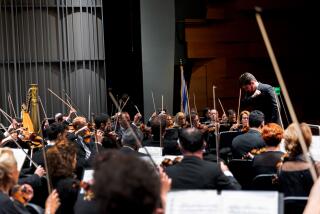Versatile bridge to Mideast cultures
- Share via
Gesher and jisr mean “bridge” in Hebrew and Arabic, respectively. And “bridge,” in the literal and the metaphorical sense, was the concept behind “Gesher-Jisr: Bridging Cultures in Conflict Through the Arts” on Friday night at the Skirball Center.
The concert featured the Chicago Classical Oriental Ensemble, led by Moroccan musician Hicham Chami with oud players Naser Mousa, from the Palestinian territories, and Yair Dalal, from Israel, as guest artists.
From a musical perspective, the event -- presented by Genesis at the Crossroads, a Chicago-based organization that promotes culture-bridging programs -- was an entertaining display of the many musical linkages that exist among Middle Eastern cultures.
In the most effective piece of the evening, the quiet tune “Salaam” (featuring Mousa singing in Arabic and Dalal in Hebrew), Mousa brought the crowd into the spirit of the performance by organizing a sing-along of its peace-oriented chorus. Other numbers centered on the duo, playing and singing individually and together, with Dalal’s soft, intimate tone contrasting amiably with Mousa’s warm, somewhat rough-hewn vocals.
The Chicago Classical Oriental Ensemble, whose members come from backgrounds that are Puerto Rican, Japanese, Israeli, Italian, Syrian, Jordanian, American, Moroccan, Palestinian and Russian, is a collective of strings, flute and percussion. Their rich textures and roving counter-melodies provided appropriate settings for the singing and playing of Dalal (who also played violin) and Mousa.
And when they performed selections by composer Kareem Roustom, they revealed considerable musical versatility, alternating lush ensemble playing with bursts of individual improvisation.
The evening was further enhanced by the appearance of an unidentified female, who gracefully moved through a dance in which the most subtle emotions were communicated by the lithe movements of hands and arms.
The program’s amiable atmosphere also included a small girl who spontaneously stepped up on stage to offer her own sweetly innocent dance movements.
Chami has noted elsewhere that musicians are not politicians, that what they do best is play together, experience the music together and listen to one another. All of which is precisely what took place in “Gesher-Jisr: Bridging Cultures in Conflict Through the Arts.”
More to Read
The biggest entertainment stories
Get our big stories about Hollywood, film, television, music, arts, culture and more right in your inbox as soon as they publish.
You may occasionally receive promotional content from the Los Angeles Times.








